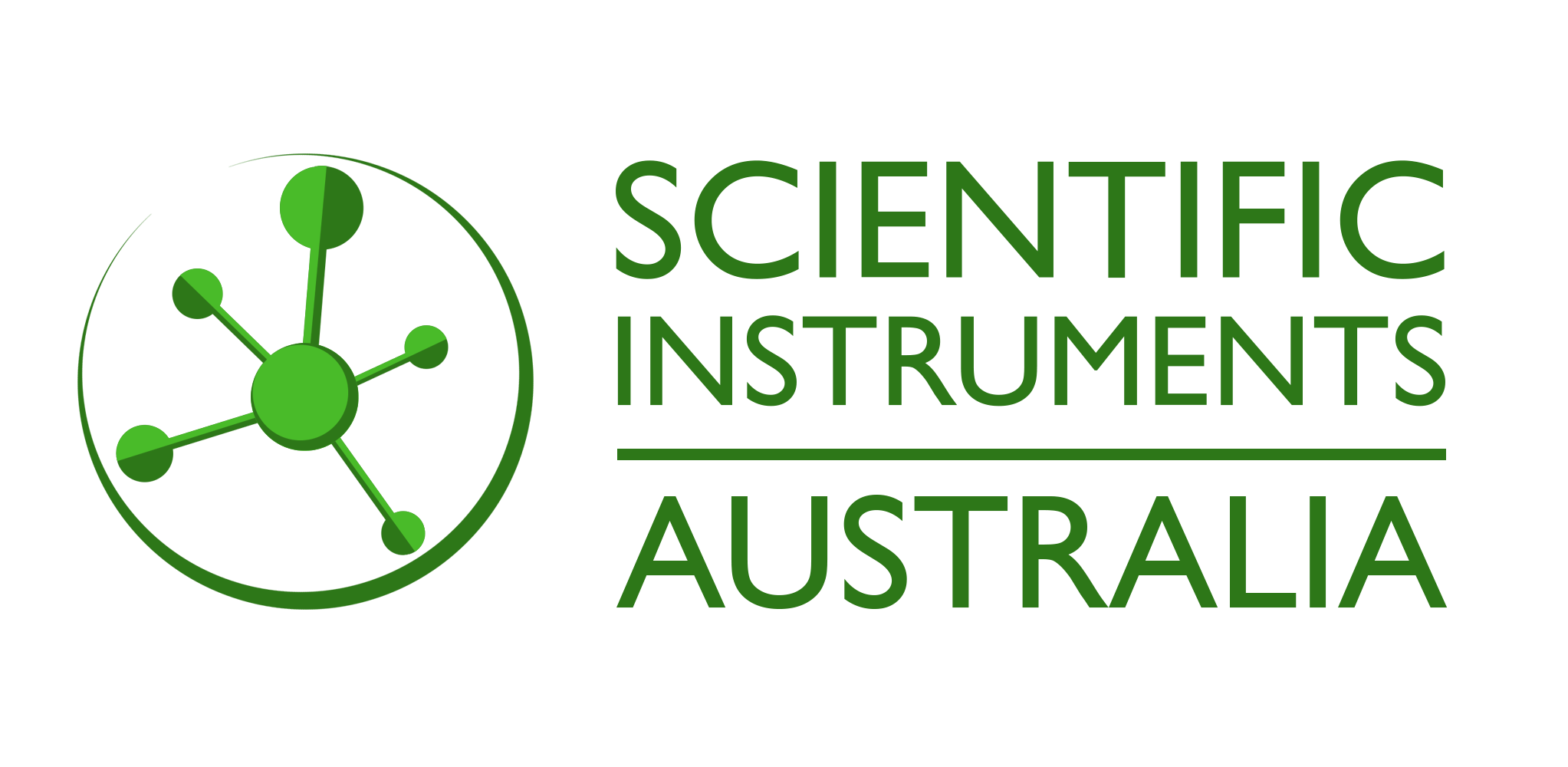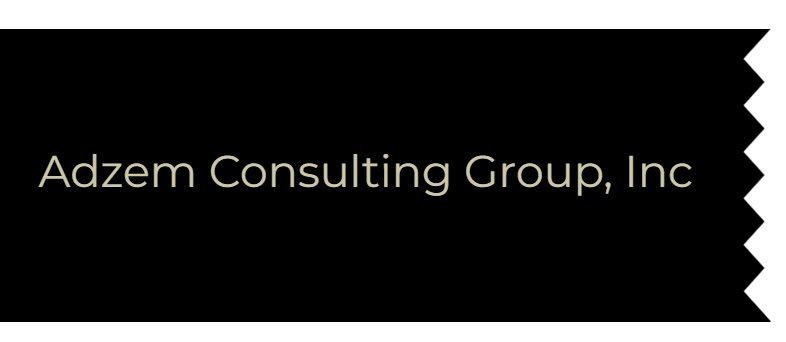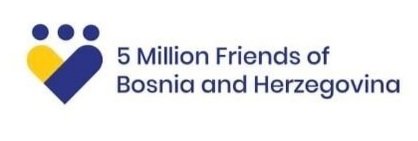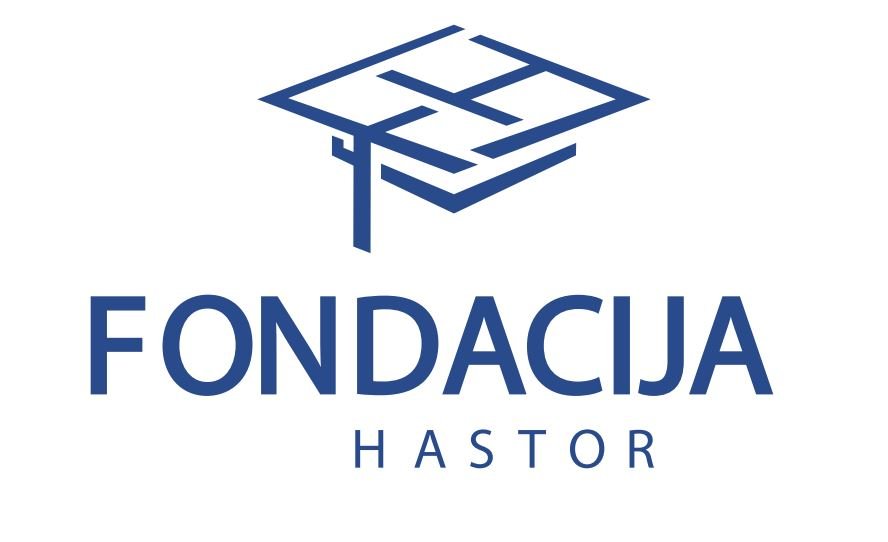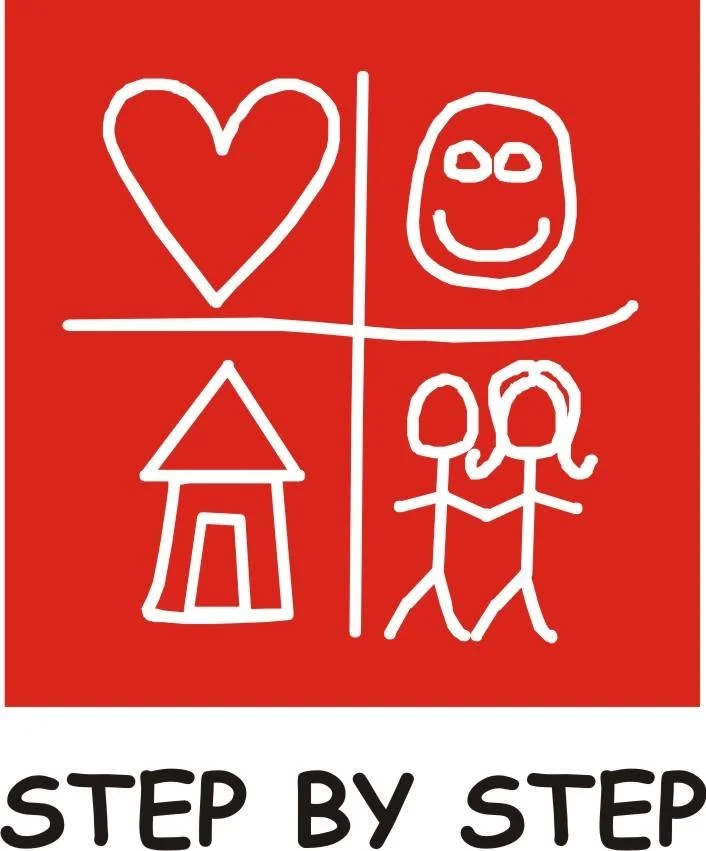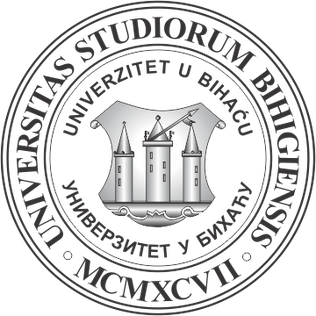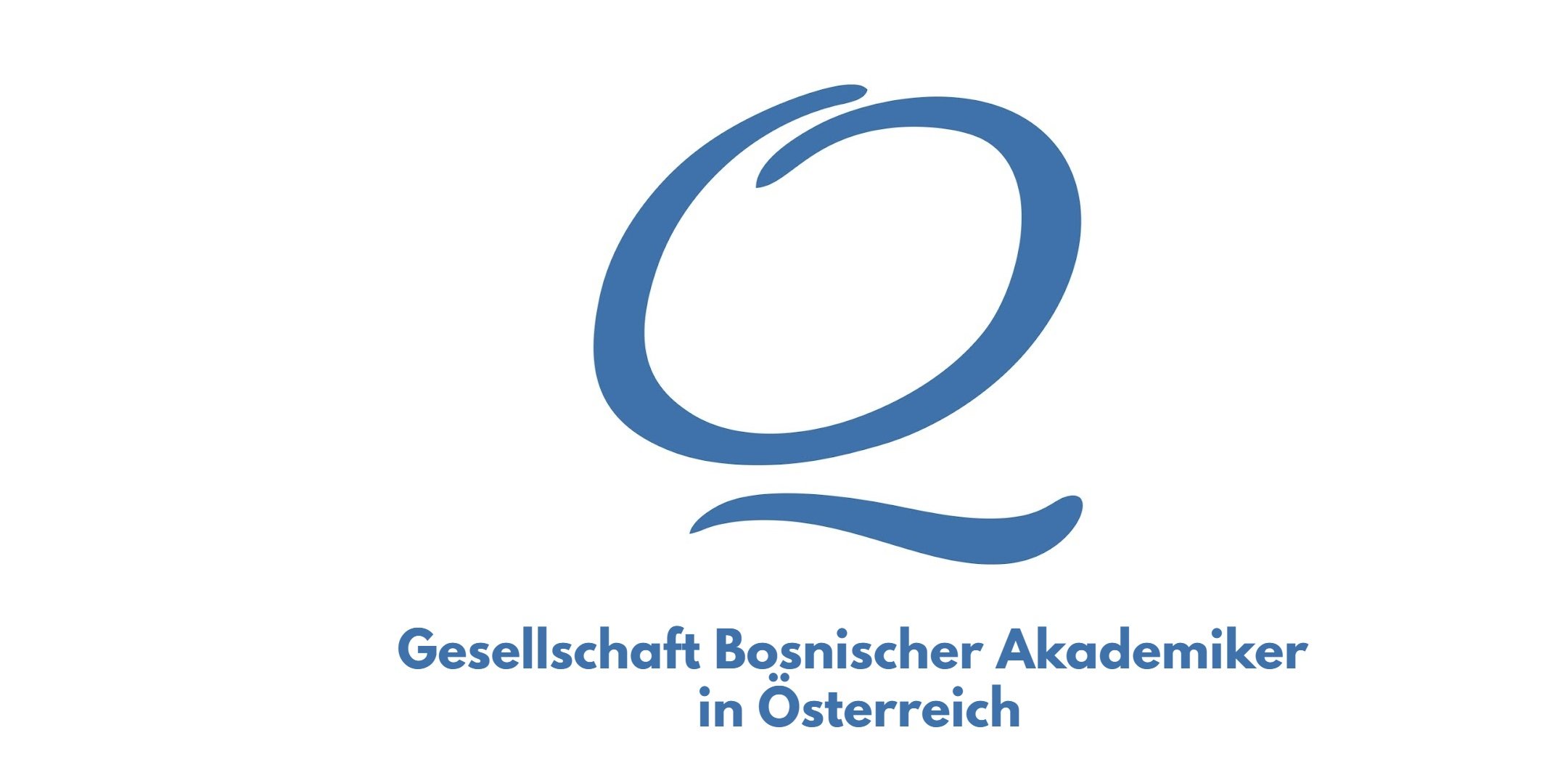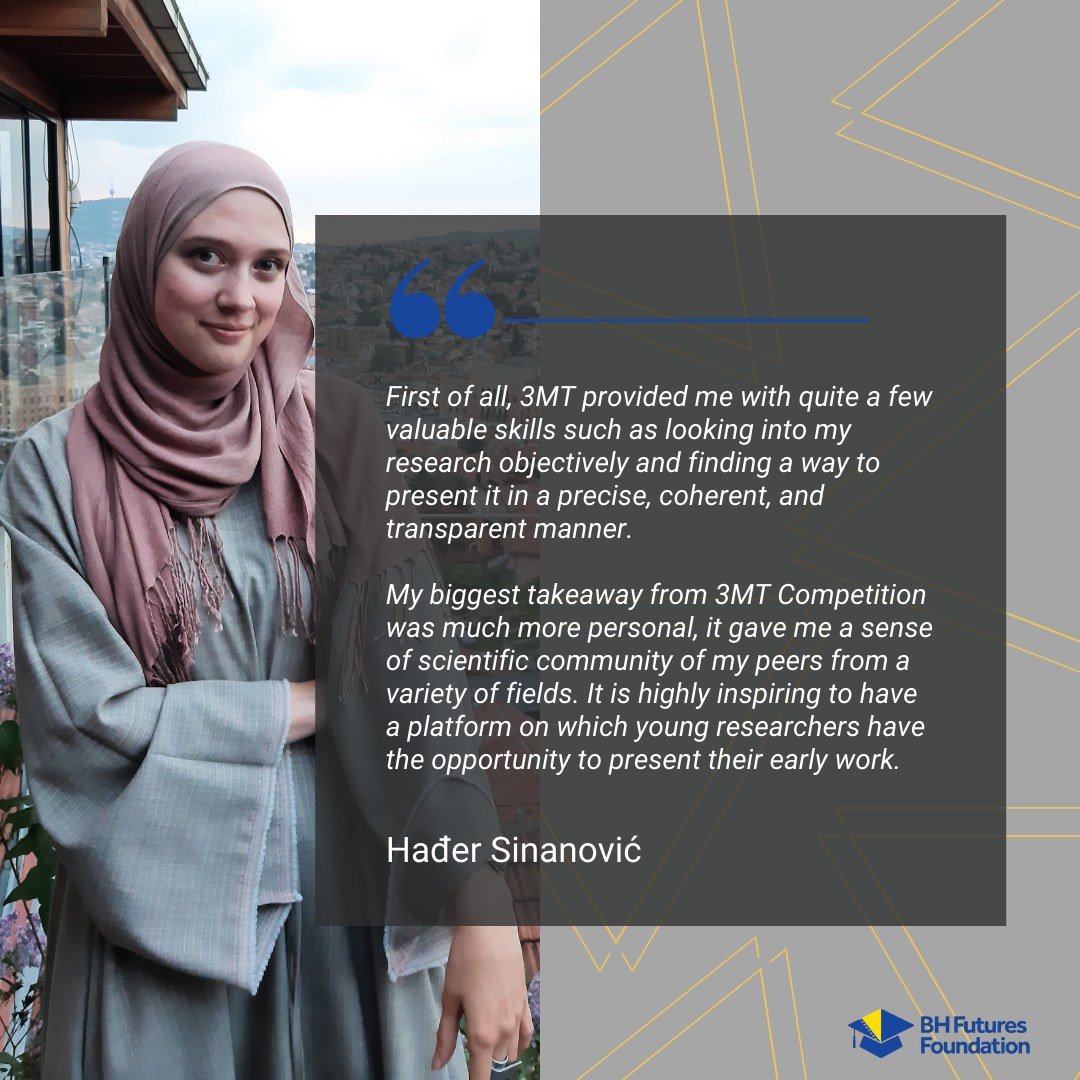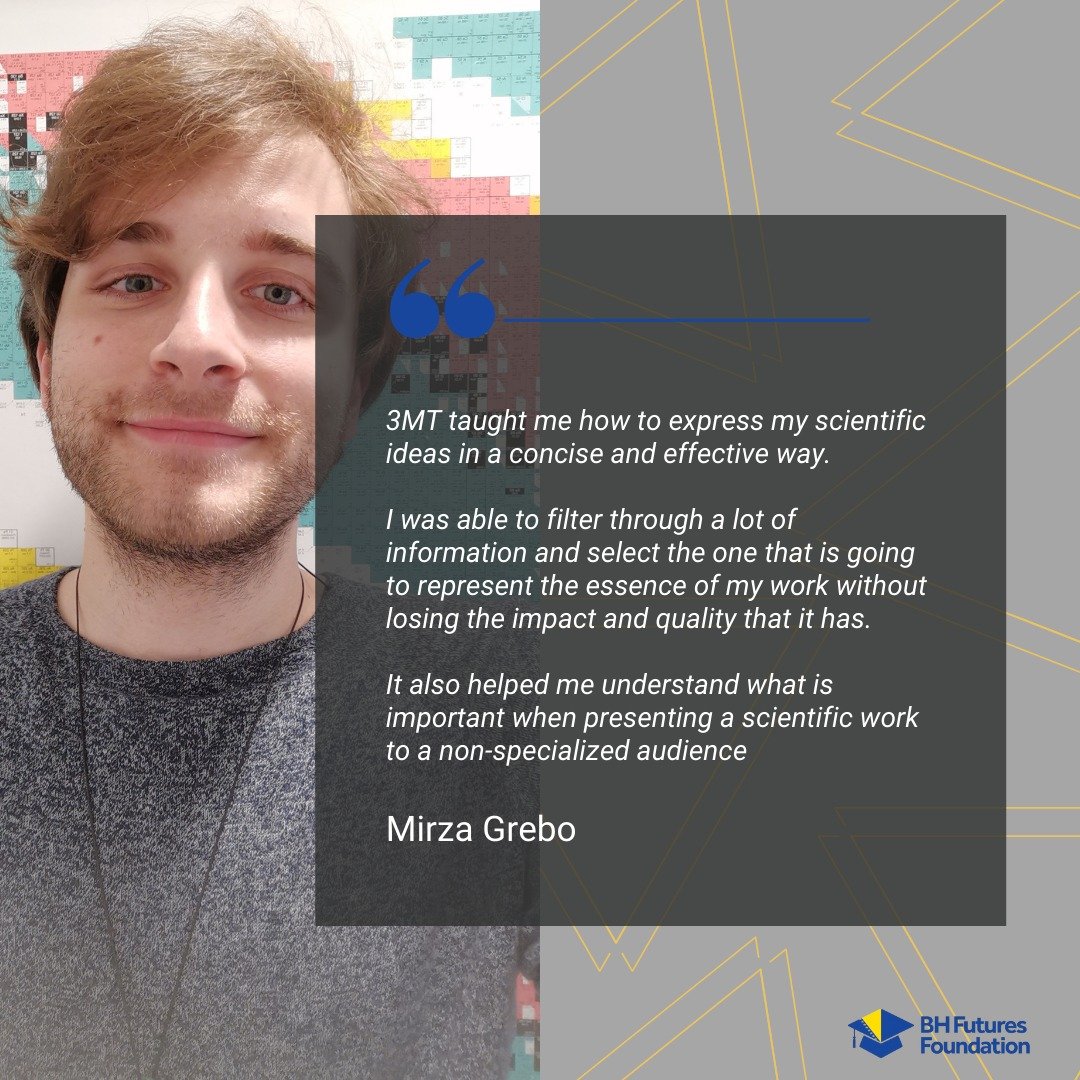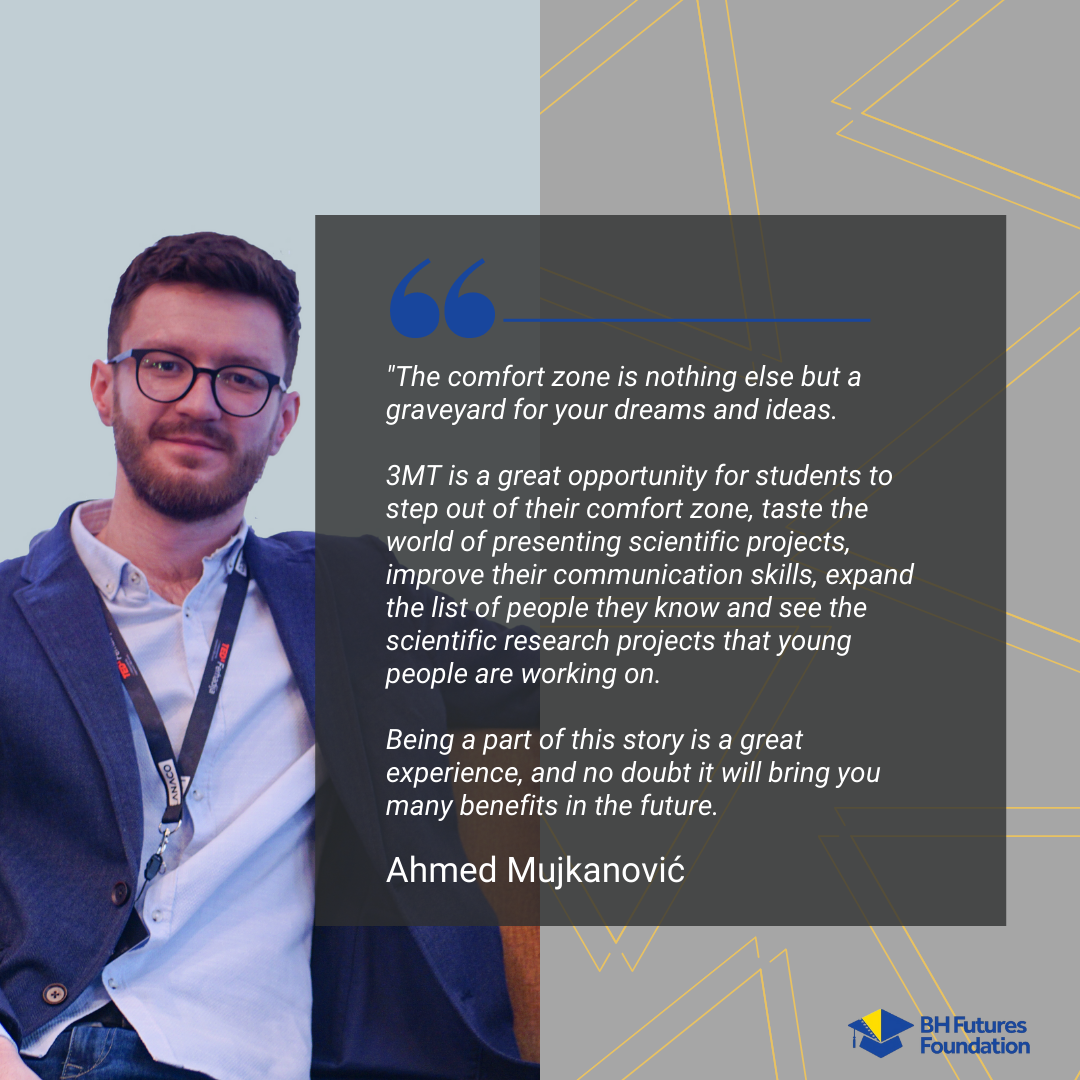SPONSORS
FRIENDS OF 3MT
“The 2022 Bosnia & Herzegovina three-minute thesis (3MT) competition challenges students (Ph.D., Masters & Undergraduate) to communicate the significance of their research projects to a non-specialist audience in just three minutes and compete for over 20,000 BAM prize money.”
Applications Closed. Awards Ceremony June 25th 15:00
The 2022 Bosnia & Herzegovina 3MT competition provides Bachelor, Masters & Ph.D. students with the opportunity to develop their academic, presentation, research communication and community leadership skills by explaining their research to a non-specialist audience. In 2020, we successfully organised the inaugural competition in which Ph.D. students were the competitors. Following the success of the 2020 edition, we organised an equally successful competition for undergraduate/masters student researchers in the homeland but also abroad. The 3MT competition will be held virtually to allow anyone from anywhere to compete. Not only will students benefit from this experience, but their respective universities/faculties will have the opportunity to showcase their research and researchers throughout the Bosnia & Herzegovina network, as well as open doors to new collaborations and networks for both researchers and supervisors. The 3MT will pit students from Bosnia & Herzegovina and the diaspora against one another.
Students will have a maximum of three minutes to deliver a compelling presentation of one of the following:
undergraduate, masters or Ph.D. dissertation (project) topic
any other project/topic that was/is the part of their undergraduate/master dissertation)
any undergraduate or masters project (not just thesis) that has an element or research undertaken
3MT is not an exercise in trivializing or ‘dumbing-down’ research but forces students to consolidate their ideas and crystalize their research discoveries.
The competition will be judged by a local & international panel consisting of industry and academic professionals.
Why are we organising the 3MT competition and what do we hope to achieve?
The primary objective of the 2021 3MT initiative will be to bring together under one umbrella talented young undergraduate/masters & Ph.D. researchers with Bosnia & Herzegovina origins and give them a platform to:
Engage with each other and a greater researcher community
Build a community of young researchers and lay the foundations for future collaboration
Disseminate important research information to the general public
Build partnerships and friendships between collaborating organisations
Showcase global research excellence of Bosnia & Herzegovina
Boost personal careers by gaining visibility and improving communications skills
Connect prospective students with world class researchers of Bosnia & Herzegovina origins
Why you should participate
Participation in the 3MT competition will allow students to develop many different skills. Former competitors have commented on the value of their experience in a variety of areas. Some highlighted reasons why you should participate:
Drastically improve your presentation skills and public speaking. Overcome public speaking anxiety and practice this important skill.
Learn how to or enhance your research communication ability. Learn to effectively explain the breadth and significance of complex research to a non-specialist audience.
Research perspective: Seeing how a research project fits within the larger picture is an important skill set. Distilling a research project into a three-minute general audience presentation allows participates to gain new perspectives on their research and helps contribute to their research and writing process.
Build a global network: get to know other competitors from around the world, discuss your research and build long term friendships.
Build key skills that are highly valued by employers in many sectors. These skills, such as public speaking and communication skills, can be featured prominently in application documents.
Check out some great examples from our 2020 PhD 3MT Competition
Competition Rules
Undergraduate and Master students can present any project/assignment that was/is part of their official studies that contains elements of originality (literature surveys or reports without original/critical analysis are not appropriate). The kind of projects students can present will vary depending on a particular field of study (e.g. experimental or theoretical research, critical essay/report, artistic research).
Ph.D. student should present their doctoral research work only.
Presentations are to be done in English (the international language of research) or local languages (Bosnian/Croatian/Serbian). However: Preference should be English
Presentations are limited to 3 minutes and competitors exceeding 3 minutes will not be allowed to compete.
A single static slide (Visual aid) is permitted (no slide transitions, animations or 'movement' of any description).
The video can be recorded at home or another venue but must have only one camera angle filmed from a static position. You must be visible when presenting.
The 3-minute audio must be continuous – no edits breaks etc. (This is why you must be visible at all times).
Presentations are considered to have commenced when a presenter starts their presentation through movement or speech
No additional electronic media (e.g. sound and video files) are permitted within the video recording. The focus is on your presentation skills.
The decision of the judging committee is final.
Judging
The judging is broken up into two sections with 5 criteria each. Each section is equally weighted. Each sections will be marked out of 5 (1 = weak, 5 = outstanding) and you will receive a score total out of 50. Judges will also provide comments for each presentation that can be used as justification for scores. Feedback can be provided to students upon request once the competition has concluded.
Comprehension and content
Did the presentation provide an understanding of the background and significance to the research question being addressed, while explaining terminology and avoiding jargon?
Did the presentation clearly describe the impact and/or results of the research, including conclusions and outcomes?
Did the presentation follow a clear and logical sequence?
Was the thesis topic, research significance, results/impact and outcomes communicated in language appropriate to a non-specialist audience?
Did the presenter spend adequate time on each element of their presentation - or did they elaborate for too long on one aspect or was the presentation rushed?
Engagement and communication
Did the oration make the audience want to know more?
Was the presenter careful not to trivialise or generalise their research?
Did the presenter convey enthusiasm for their research?
Did the presenter capture and maintain their audience's attention? Did the speaker have sufficient stage presence, eye contact and vocal range; maintain a steady pace, and have a confident stance?
Did the Visual Aid (slide/image) enhance the presentation - was it clear, legible, and concise?
Please note: Competitors *will not* be judged on video/ recording quality or editing capabilities (optional inclusions). However, you must presentation must be audible. Judging will focus on the presentation, ability to communicate research to a non-specialist audience, and 3MT visual aid (slide/image).
Please note: As decided by the judging committee, if an applicant does not have a slide/visual aid, then the mark for the previous category will be doubled.
Eligibility and who can apply?
Born in Bosnia & Herzegovina / Have Bosnian citizenship or be considered diaspora (For example, if you were born in the USA but draw roots from Bosnia & Herzegovina you are eligible). You are also eligible if you were born in Bosnia & Herzegovina but are undertaking your undergraduate, master studies or Ph.D. in another country or in BH.
Currently enrolled into an undergraduate/masters program OR completed studies in the last 12 months.
Any discipline is eligible.
Awards
We recognize the importance of this competition, its significance for research in the Bosnia & Herzegovina global community but also value your work and time. There will be two types of awards.
Undergraduate/Masters/Ph.D. total award pool 20,000 BAM
Awards for Ph.D. candidates
1st Place - 3000 BAM
2nd Place - 2000 BAM
3rd Place - 1000 BAM
4-10th Place - 100 BAM Amazon or http://kupipoklon.ba/ voucher
Awards for Bachelor/Masters candidates (judged individually)
1st Place - 1500 BAM
2nd Place - 1000 BAM
3rd Place - 500 BAM
4-10th Place - 100 BAM Amazon or http://kupipoklon.ba/ voucher
Awards (judged by the public via YouTube)
Best overall presentation as judged by public (Bachelor) - 500 BAM
Best overall presentation as judged by public (Masters) - 500 BAM
Best overall presentation as judged by public (Ph.D.) - 1000 BAM
Best overall
Best overall STEM presentation - 400 BAM
Best overall Humanities/Arts presentation - 400 BAM
Best overall Medical/Physical Sciences presentation - 400 BAM
Best overall Business/Economics presentation - 400 BAM
Ph.D., Bachelor and Masters students will be judged separately. There will be two types of awards. The first is judging conducted by an independent committee of academics and the second category of awards will be judged by the public. Public voting is counted by the number of thumbs up on your YouTube video.
Submission details & Application
Videos will be submitted by applicants via a website form (given below). The competitor should provide a link so that we can download your video. (please ensure your link is not set to private)
Your video submission can be in English or local languages (Bosnian/Croatian/Serbian).
If your video submission is in English, you will need to provide Bosnian/Croatian/Serbian closed caption or .srt file.
If your video submission is in Bosnian/Croatian/Serbian, you will need to provide English closed caption or .srt file.
There will be an initial screening to see eligibility and quality upon which the videos will be uploaded to our YouTube channel.
Videos will be uploaded on our YouTube channel and ready for full public sharing. This will be the primary hosting of videos.
In the Google form below, we must seek permission for the presentations to be publicly shared. Each competitor will need to make sure they check this with their supervisors and institutions. If selected into the finals, competitors will be notified. Their video shall be uploaded on the competition official YouTube channel.
Meet the competition judges
Our diverse expert judging panel comes from all over the world and has diverse & vast experience in research, publication presentations and reviewing work. Our judges are bound by an ethical and conflict of interest declaration. Under no circumstances should you attempt to lobby judges at any stage of the competition.
LIST OF JUDGES FOR UNDERGRADUATE & MASTERS'S STUDENT IN 3MT 2022
Ahmed Mujkanovic, University of Zenica, Bosnia and Herzegovina
Ajla Dzanko, University of Groningen, Netherlands
Almir Aljovic, University of Munich, Germany
Amar Cemanovic, Istanbul Technical University, Turkey
Amina Tucak-Smajic, University of Sarajevo - Faculty of pharmacy, Bosnia and Herzegovina
Arman Korajac, Jozef Stefan Institute, University of Ljubljana, Slovenia
Azra Frkatovic, Genos Glycoscience Research Laboratory, Croatia
Dalila Destanovic, University of Vienna, Austria
Dijana Mujkanovic, University of Pittsburgh, USA
Danijala Bjelogrlic, SNHU, USA
Dunja Veselinovic, Amazon, USA
Emina Dzaferovic - Masic, University of Zagreb, Croatia
Emina Malkic - Okanovic, University of Sarajevo, Bosnia and Herzegovina
Emina Sunje, Faculty of Science, University of Sarajevo, Bosnia and Herzegovina
Emir Nazdrajic, University of Waterloo, Canada
Faruk Sehic, University of Tuzla, Bosnia and Herzegovina
Hana Hodzic, Faculty of Electrical Engineering, University of Sarajevo, Bosnia and Herzegovina
Harun Muhic, Infobip LLC Qatar, Qatar
Ilma Delic, University of Sarajevo, Bosnia and Herzegovina
Ishak Kovac, Institute of Organic Chemistry and Biochemistry, Czech Republic
Jelena Simunovic, University of Zagreb, Croatia
Kajs Hadzic, University of Vienna, Austria
Milana Komosar, Technische Universität Ilmenau, Germany
Minela Viteskic - Nurovic, University of Sarajevo, Bosnia and Herzegovina
Mirza Grebo, Technical University of Munich, Germany
Mirza Ramic, Aarhus University, Denmark Denmark
Merima Mehic, The Francis Crick Institute, UK
Naida Hodzic, Université Gustave Eiffel, France
Nejra Cosic, Medical University of Graz, Austria
Nerma Caluk, Florida International University, USA
Nermina Brljak, University of Miami, USA
Rialda Spahic, Norwegian University of Science and Technology, Norway
Rijad (Rick) Saric, La Trobe University, Australia
Rijad Kaniza, Academy of Music and Fine Arts, University of Sarajevo, Bosnia and Herzegovina
Semra Smajic, University of Luxembourg, Luxembourg
Smirna Malkoc, Pädagogische Hochschule Steiermark, Austria
Suzana Stapar Box Hill Institute, Melbourne, Australia
Tariq Purivatra, University of Toronto, Canada
Tijana Tufek - Memisevic, Candarc LLC, USA
Timur Hukic, Zhejiang University, China
Una Tanovic, American University of Sharjah, United Arab Emirates
Vahida Velic, University of Sarajevo, Bosnia and Herzegovina
Zerina Kurtovic, Karolinska Institute, Sweden
Zorana Štaka, University of Belgrade, Serbia
LIST OF JUDGES FOR Ph.D. STUDENTS IN 3MT 2022
Abdel F. Isakovic, Colgate University, USA
Adis Muminovic, University of Sarajevo, Bosnia and Herzegovina
Ajdin Halilovic, E.ON, Bosnia and Herzegovina
Ajla Hrle, Immatics, Germany
Alija Pasic, Budapest University of Technology, Hungary
Almir Peštek, School of Economics and Business, University of Sarajevo, Bosnia and Herzegovina
Amel Durakovic, CEICO, Czech Republic
Amela Delic, University of Tuzla, Bosnia and Herzegovina
Amela Dizdarevic, The University of Manchester, UK
Amela Groso, EPFL, Lausanne, Switzerland
Amila Akagic, University of Sarajevo, Bosnia and Herzegovina
Amila Haskic, University of Sarajevo, Bosnia and Herzegovina
Amir Mujkanovic, Academic Mentor, Austria
Amir Tabakovic, Organisation for Applied Scientific Research (TNO), Netherlands
Amra Hasečić, Faculty of Mechanical Engineering, University of Sarajevo, Bosnia and Herzegovina
Amra Salihbegovic, Polytechnic University of Milan, Italy
Anela Lolic, Technical University of Vienna, Austria
Arnela Mehmedbasic, Rigshospitalet, Denmark
Azra Bihorac, University of Florida, USA
Badema Pitic, University of Southern California, USA
Belma Bourne, Nova Southeastern, USA
Đenita Kuštrić, The Academy of Fine Arts, University of Sarajevo, Bosnia and Herzegovina
Damir Hamamdzic, Johnson & Johnson, USA
Dragan Coric, Diversity, Equity and Inclusion in Patent World, Switzerland
Dragan Damjanovic, EPFL, Switzerland
Dženan Zukić, Kitware Inc., USA
Dzeneta Karabegovic, University of Salzburg, Austria
Edhem (Eddie) Custovic, La Trobe University, Australia
Edin Golubovic, EnOcean GmbH, Germany
Edin Husic, The Dalle Molle Institute for Artificial Intelligence Research, Switzerland
Eldad Herceg, Dow Inc., USA
Emma Pinjic, Boston University School of Medicine, USA
Enisa Zanacic, Integrated water systems Inc, Canada
Haris Krijestorac, HEC Paris, France
Haris Piplas, Drees & Sommer, Switzerland
Helena Mihaljevic, Hochschule für Technik und Wirtschaft Berlin (HTW), Germany
Igor Karaca, Oklahoma State University, USA
Ines Dedovic, Exentis Innovations GmbH, Germany
Irnela Bajrovic, Askpleios Biopharmaceutical, USA
Jasmin Jahic, University of Cambridge, UK
Kemal Aganovic, German Institute of Food Technologies, Germany
Kenan Sehic, Lund University, Sweden
Kenan Tokmic, Entegris, USA
Larisa Kurtovic, University of Ottawa, Canada
Lejla Alic, University of Twente, Netherlands
Maja Babic, University of Groningen, Netherlands
Maja Varatanovic, University of Sarajevo, Bosnia and Herzegovina
Merisa Nisic, minds + assembly, USA
Milan Vrucinic, Accenture (University of Cambridge Alumni), UK
Mirza Tihic, Syracuse University, USA
Muamer Kadic, Institute FEMTO-ST, France
Nevena Mahmutbegovic, Clinical Center of the University of Sarajevo, Bosnia and Herzegovina
Nina Adjanin, Northwest Missouri State University, USA
Nina Dumrukcic, University of Cologne, Germany
Nirvana Pistoljevic, EDUS-Education for All, USA
Rada Petric, UNC-Chapel Hill, USA
Sabina Karacic, University Hospital BonnInstitute of Medical Microbiology, Immunology and Parasitology, Germany
Sabit Delic, MLL Munich Leukemia Laboratory, Germany
Sandra Hasanefendic, Vrije Universiteit Amsterdam, Netherlands
Sandra Selmanovic, Hochschule München University of Applied Science, Germany & Anglia Ruskin University, UK
Seid Koric, University of Illinois, USA
Selma Porobic, Aurora European Universties Alliance, Czech Republic
Senka Krivic, University of Sarajevo, Bosnia and Herzegovina
Slobodan Fazlagic, University of Sarajevo Bosnia and Herzegovina
Tanja Sovic, Vienna University of Technology, Austria
Vesna Cuplov, Institut Curie, France
Zlatan Aksamija, University of Utah, USA
Zlatan Mujagic, Maastricht University Medical Center, Netherlands
Zlatan Mujkic, Eurosjaj, Bosnia and Herzegovina
Zlatan Stanojevic, Global TCAD Solutions GmbH, Austria



